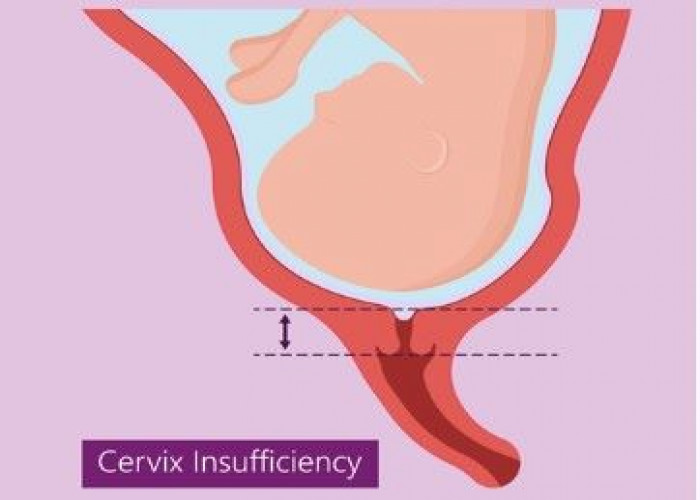 Welcome
Welcome
“May all be happy, may all be healed, may all be at peace and may no one ever suffer."
Incompetent cervix

An incompetent cervix, also known as cervical insufficiency, is a condition in which the cervix (the lower part of the uterus) is weakened and is unable to support a pregnancy. The cervix may begin to dilate and efface (thin out) prematurely, leading to premature labor and delivery.
An incompetent cervix can be caused by a variety of factors, including previous surgery on the cervix, uterine anomalies, or genetics. However, in many cases, the cause is not known.
Women with incompetent cervix may not experience any symptoms until the cervix has already started to open. Signs of an incompetent cervix may include back pain, vaginal pressure or a sensation of pressure on the cervix, or mild vaginal bleeding.
Treatment for an incompetent cervix may involve a procedure called a cerclage, which involves stitching the cervix closed to prevent it from dilating prematurely. Bed rest and medication to prevent preterm labor may also be recommended.
Women who have had a previous premature birth, have had surgery on their cervix, or have other risk factors for incompetent cervix may be monitored more closely during pregnancy. It is important to seek medical care if you experience any symptoms or have concerns about your pregnancy.
Research Papers
Disease Signs and Symptoms
- Pelvic pain
- Abdomen cramps
- Watery vaginal discharge
- Sensation of pelvic pressure
Disease Causes
Disease Prevents
Incompetent cervix
You can't prevent an incompetent cervix — but there's much you can do to promote a healthy, full-term pregnancy. For example:
- Seek regular prenatal care. Prenatal visits can help your doctor monitor your health and your baby's health. Mention any signs or symptoms that concern you, even if they seem silly or unimportant.
- Eat a healthy diet. During pregnancy, you'll need more folic acid, calcium, iron and other essential nutrients. A daily prenatal vitamin — ideally starting a few months before conception — can help fill any dietary gaps.
- Gain weight wisely. Gaining the right amount of weight can support your baby's health. A weight gain of 25 to 35 pounds (about 11 to 16 kilograms) is often recommended for women who have a healthy weight before pregnancy.
- Avoid risky substances. If you smoke, quit. Alcohol and illegal drugs are off-limits, too. In addition, get your doctor's OK before taking any medications or supplements — even those available over-the-counter.
If you've had an incompetent cervix during one pregnacy, you're at risk of premature birth or pregnancy loss in later pregnancies. If you're considering getting pregnant again, talk with your doctor to understand the risks and what you can do to promote a healthy pregnancy.
Disease Treatments
Treatments for or approaches to managing an incompetent cervix might include:
- Progesterone supplementation. If you have a history of premature birth, your doctor might suggest weekly shots of a form of the hormone progesterone called hydroxyprogesterone caproate (Makena) during your second and third trimester. However, further research is needed to determine the best use of progesterone in cervical insufficiency.
- Repeated ultrasounds. If you have a history of early premature birth, or you have a history that may increase your risk of cervical insufficiency, your doctor might begin carefully monitoring the length of your cervix by giving you ultrasounds every two weeks from week 16 through week 24 of pregnancy. If your cervix begins to open or becomes shorter than a certain length, your doctor might recommend cervical cerclage.
- Cervical cerclage. If you are less than 24 weeks pregnant or have a history of early premature birth and an ultrasound shows that your cervix is opening, a surgical procedure known as cervical cerclage might help prevent premature birth. During this procedure, the cervix is stitched closed with strong sutures. The sutures will be removed during the last month of pregnancy or during labor.
- If you have a history of premature births that are likely due to cervical insufficiency, your doctor might also recommend cervical cerclage before your cervix begins to open (prophylactic cerclage). This procedure is typically done before week 14 of pregnancy.
- Cervical cerclage isn't appropriate for everyone at risk of premature birth. The procedure isn't recommended for women carrying twins or more. Be sure to talk to your doctor about the risks and benefits of cervical cerclage.
Your doctor might also recommend the use of a device that fits inside the vagina and is designed to hold the uterus in place (pessary). A pessary can be used to help lessen pressure on the cervix. However, further research is needed to determine if a pessary is an effective treatment for cervical insufficiency.
Disease Diagnoses
Disease Allopathic Generics
Disease Ayurvedic Generics
Disease Homeopathic Generics
Disease yoga
Incompetent cervix and Learn More about Diseases

Myocarditis

Stress incontinence

Truncus arteriosus

Toxic shock syndrome

Temporal lobe seizure

Bundle branch block

Glucoma

Female sexual dysfunction
incompetent cervix, অসমাপ্ত জরায়ু
To be happy, beautiful, healthy, wealthy, hale and long-lived stay with DM3S.
